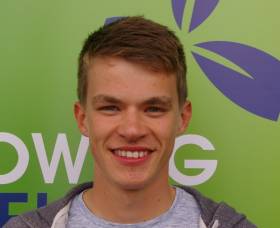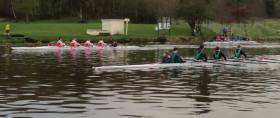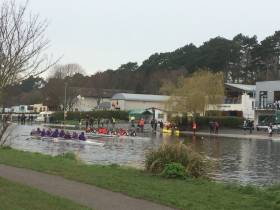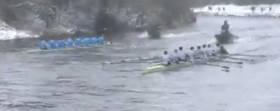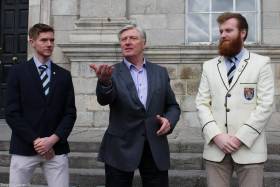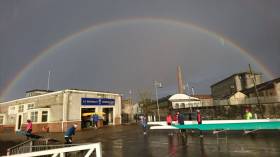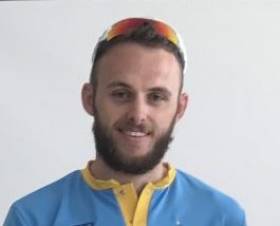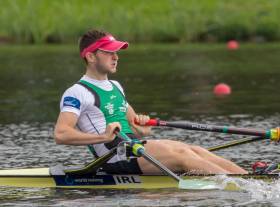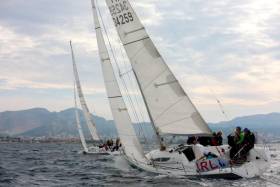Displaying items by tag: UCD
#Rowing: Trinity won the women’s senior eight at Trinity Regatta. The host crew were commanding winners over a Commercial eight made up of UCD alumni. In the semi-final they had beaten a Commercial eight made up of Trinity alumni.
Blue Star, the alumni club of Newcastle University, won the men’s intermediate eight. UCD were unable to finish after a race which featured a number of clashes and a restart. Blue Star featured British Olympians George Nash and Scott Durant (both gold medallists in 2016) as well as Irish Olympian Cormac Folan.
Trinity Regatta, Islandbridge, Saturday (Selected Results)
Men
Eight – Senior: Trinity bt Commercial 1 1/3 l. Club: Commercial bt Neptune A 1 ¾ l. Novice: UCD A; Trinity disuqual.
Four – Sen, coxed: Commercial B.
Sculling,
Quadruple – Jun 18: Neptune bt Three Castles 4l. Jun 18B, coxed: Blackrock. Jun 16: Graiguenamanagh. Masters, coxed: Commercial.
Single – Sen: Commercial (N Beggan) bt Carlow (L Keating) 1l. Inter: Sligo (G Patterson). Club One: Bann A (Christie). Junior: Carlow (J Keating) bt Neptune (J Butler) easily. Jun 16: Neptune (T Orlic). Masters: Thames (C George).
Women
Eight – Senior: Trinity bt Commercial, 2l. Inter: Trinity B bt Trinity A ¼ l. Club One: Commercial bt Neptune 2l. Nov: UCD A. Jun 18: Bann bt Graiguenamanagh, easily. Jun 16B: Graiguenamanagh. Masters: Tribesmen A.
Four – Inter: Trinity A. Masters, coxed: Belfast BC/Tribesmen.
Sculling,
Quadruple, Club One, coxed: Neptune. Nov, coxed: Trinity r/0. Jun 18B, coxed: Graiguenamanagh bt Neptune 1 ½ l.
Double – Senior: Neptune bt Njord easily.
Single – Inter: Neptune (Feerick). Club One: Neptune (Clarke). Club Two: Neptune (Clarke). Jun 18A: Neptune (Clarke). Jun 16: City Of Derry (E Murphy).
#Rowing: Trinity won the men’s senior eights at the University Championships of Ireland at the National Rowing Centre in Cork today. The race had a thrilling finish: Trinity led by less than a length, but UCD finished strongly and almost caught them. NUIG won the women’s senior eight much more comfortably, from Trinity.
The overall winners were NUIG, who also won the Bank of Ireland Trophy for women. The men’s award, the Wylie Cup, went to Trinity.
Fintan McCarthy of UCC won the senior single sculls from Andrew Goff of UCD and Selma Bounane of UCC topped the rankings in the women’s senior single.
University Championships of Ireland, National Rowing Centre (Selected Results)
Men
Eights – Senior: 1 Trinity, 2 UCD, 3 UCC. Inter: 1 Trinity, 2 UCD, 3 UCC. Club: 1 Trinity, 2 NUIG, 3 UCC. Novice: 1 UCD A, 2 Trinity A, 3 Queen’s A.
Four – Sen: UCD. Inter, coxed: Trinity. Club, coxed: UCC.
Pair – Sen: UCD.
Sculling, Quadruple, coxed – Novice: University of Limerick. Double – Inter: Queen’s. Single - Sen: UCC (F McCarthy). Inter: Univ of Limerick (K Mannix)
Women
Eights – Senior: 1 NUIG, 2 Trinity A, 3 Trinity B. Inter: 1 NUIG, 2 Trinity A, 3 Queen’s. Club: 1 NUIG, 2 Queen’s, 3 UCD A. Novice: 1 UCD, 2 Queen’s A, 3 Queen’s B.
Four – Sen: NUIG. Inter, coxed: NUIG A. Club, coxed: NUIG A.
Pair – Sen: UCC.
Sculling, Quadruple – Nov: Queen’s B. Double – Inter: NUIG. Single – Sen: UCC (Bounane). Inter: UCC (L Heaphy).
Overall Winners: NUIG. Wylie Cup for Men: Trinity. Bank of Ireland Trophy for Women: NUIG.
Trinity Take Senior Eights at Neptune Regatta
#Rowing: Trinity looked strong as they beat UCD in the men’s senior eights final at Neptune Regatta this evening. The final verdict was under a length, but as the crews passed the Neptune boathouse the men in white looked in control.
Neptune took two wins by tiny margins. They won the club one coxed fours by two feet and the club two coxed quadruple by just one foot.
There was a spectacular incident at the end of the women’s masters’ eight final. Tribesmen beat the hosts, but crashed against the bank just after the finish.
The regatta was hit by a hail and rain shower just after 5.20 and the programme ran late.
Neptune Regatta, Islandbridge, Saturday (Selected Results)
Men
Eight – Senior: Trinity bt UCD ¾ l, 3:13. Club One: UCD B bt Neptune ¾ l, 3:20. Novice: UCD B bt Trinity 3l, 3:30. Junior 18: Neptune bt Col Iognaid 2l, 3:27. Jun 16: Col Iognaid bt Blackrock 3l, 3:49. Jun 15: Bann bt St Joseph’s 1 ½ l. Masters: Old Collegians bt Neptune 1l.
Four – Senior, coxed: Trinity B bt UCD 2l, 3:35. Club One, coxed: Neptune bt UCD 2ft, 3:43. Jun 18, coxed: Col Iognaid bt Commercial 2/3 l, 4:14. Masters, coxed: Athlone bt Neptune ¾ l.
Sculling, Quadruple – Club Two, coxed: Neptune bt Bann 1ft, 3:57. Jun 18: Col Iognaid bt Three Castles 2l, 4:06. Jun 16, coxed: Fermoy bt Bann 3:50. Jun 15, coxed: Blackrock A bt Galway easily, 4:16.
Double – Jun 16: Col na Coiribe bt Commercial A 3l, 4:01.
Single – Senior: Commercial (N Beggan) bt Portadown (A Laivins) easily, 3:58. Inter: Offaly (C Brady) bt Garda (P Ryan) 2 ½ l, 4:40. Club One: Commercial (D Crowley) bt Portadown (A Laivins) 2/3 l 4:10. Club Two: Clonmel (S O’Donnell) bt Garda (P Ryan) 4l, 4:25. Jun 18: New Ross (L Sutton) bt Commercial (C Kelly) easily, 4:00. Jun 16: Neptune (T Orlic) r/0.
Women
Eight – Club One: Commercial bt UCD B 2l, 3:50. Jun 18: Graiguenamanagh bt Col Iognaid, canvas 3:53. Novice: UCD A bt UCD B 4l, 4:00. Jun 16: Commercial bt Fermoy 2 ½ l, 4:07. Jun 15: Galway bt Enniskillen 4l. Masters: Tribesmen bt Neptune 3l.
Four – Club One, coxed: UCD B bt UCD A 2 ½ l, 4:48.
Sculling, Quadruple – Club Two, coxed: Graiguenamanagh A bt King’s Hospital 2l, 4:27. Jun 18: Col Iognaid bt Neptune 3l, 4:56. Jun 16, coxed: Commercial bt Carlow 2 ½, 4:12. Jun 15, coxed: Carlow bt Athlone 2 ½ l. Double – Jun 16: Fermoy A bt Commercial B, easily, 4:34.
Single – Club One: Athlone (Y Curley) r/0. Club Two: Clonmel (S McGrath) bt Clonmel (E Fitzpatrick) 4l. Jun 18: Commercial (K Dolan) bt Neptune (N Clarke) 1ft, 4:30. Jun 16: Carlow (S Scully) r/o.
#Rowing: The first set of finals at Neptune Regatta was a good one for UCD. Their B crew beat Neptune – by three-quarters of a length – in the competitive club one eights and their B crew beat Trinity in the novice eights. However, Trinity won the battle of the senior coxed fours – their B crew beat UCD. The host club provided be the top junior 18 eight, beating Coláiste Iognáid in the final.
The women’s junior 18 eight gave Graiguenamanagh a win over Coláiste Iognáid by a canvas, while the club one eights went to Commercial, who beat UCD B. In the closest race of the session, Katie Dolan of Commercial beat Niamh Clarke of Neptune by just one foot in the women’s junior 18 single sculls. Luke Sutton of New Ross won the men’s junior 18 single.
Neptune Regatta, Islandbridge, Saturday (Selected Results)
Men
Eight – Club One: UCD B bt Neptune ¾ l, 3:20. Novice: UCD B bt Trinity 3l, 3:30. Junior 18: Neptune bt Col Iognaid 2l, 3:27. Jun 15: Bann bt St Joseph’s 1 ½ l.
Four – Senior, coxed: Trinity B bt UCD 2l, 3:35. Masters, coxed: Athlone bt Neptune ¾ l.
Sculling, Quadruple – Jun 16, coxed: Fermoy bt Bann 3:50.
Double – Jun 16: Col na Coiribe bt Commercial A 3l, 4:01.
Single – Club Two: Clonmel (S O’Donnell) bt Garda (P Ryan) 4l, 4:25. Jun 18: New Ross (L Sutton) bt Commercial (C Kelly) easily, 4:00.
Women
Eight – Club One: Commercial bt UCD B 2l, 3:50. Jun 18: Graiguenamanagh bt Col Iognaid, canvas 3:53. Novice: UCD A bt UCD B 4l, 4:00. Jun 15: Galway bt Enniskillen 4l.
Sculling, Quadruple – Jun 16, coxed: Commercial bt Carlow 2 ½, 4:12. Double – Jun 16: Fermoy A bt Commercial B, easily, 4:34.
Single – Club Two: Clonmel (S McGrath) bt Clonmel (E Fitzpatrick) 4l. Jun 18: Commercial (K Dolan) bt Neptune (N Clarke) 1ft, 4:30.
Trinity Draw on Fitness to win Gannon Cup
#Rowing; Trinity won the Gannon Cup with a fine performance today. The Colours races were run on a reverse of the Trinity Regatta course above the weir for safety reasons. There was a strong east wind and a powerful flow.
UCD took a one-length lead in the Gannon Cup at the first bend, but Trinity came back to lead and held on. Trinity’s senior women won the Corcoran Cup with a commading performance.
The novice women’s title (the Sally Moorhead Trophy) was won easily by UCD. The closest race of the day was the novice men’s race, which was a thrilling contest. Trinity led past the boat clubs, but UCD overtook them and led by a length. Trinity came back to retake the lead … only for UCD to overhaul them right at the finish line.
Colours Races 2018, Islandbridge (raced above the weir because of bad weather)
Senior Men (Gannon Cup): Trinity (B Cronin, D Butler, W Doyle, G Moore, A Liadov, D Pierse, T Hughes, M Quigley; cox: R Hamilton) bt UCD, ¾ l.
Novice Men (Dan Quinn Shield): UCD bt Trinity 2ft.
Senior Women (Corcoran Cup): Trinity (D Maguire, S Kelly, A Byrne, J Hogg, A Corcoran, C Dempsey, L McHugh, S Higgins; cox: M Jungmann) bt UCD easily.
Novice Women (Sally Moorhead Cup): UCD bt Trinity easily
UCD Rowers Win the Spin In First Colours Battle
#Rowing: UCD won both coin tosses and will row from the North Station in all four Colours races on the Liffey on March 18th. Pat Kenny performed the coin toss at Trinity College, assisted by the four captains: Emma Thornton (UCD Ladies Boat Club); Laura Walsh (Dublin University Boat Club), Shane Mulvaney (UCD Boat Club) and Conor Ryan (Dublin University Boat Club).
The toss was set for early in the week but was delayed until Thursday.
The schedule set for Sunday, March 18th, is:
10:30 Sally Moorhead Trophy (novice women)
11:00 Dan Quinn Shield (novice men)
11:30 Corcoran Cup (senior women)
12:00 Gannon Cup (senior men)
St Michael's Head Gives UCD Eight a Boost
#Rowing: UCD’s men’s intermediate eight just came out on top as the fastest crew at the St Michael’s Head of the River in Limerick. They clocked 19 minutes and 39 seconds, just ahead of the 19 minutes 43.4 seconds of the NUIG senior eight. Carlow Rowing Club’s women’s junior coxed four just pipped NUIG’s women’s senior eight as the fastest women’s crew.
| Rank | Bib nr | Name | Result | Penalty | Speed |
| Womens J18A 2X | |||||
| 1 | 48 | St. Michael's Rowing Club | 00:33:30.0 | 9.31 km/h | |
| Womens Novice 4X+ | |||||
| 1 | 20 | St. Michael's Rowing Club | 00:35:08.7 | 8.88 km/h | |
| Mens Senior 8+, (A) | |||||
| 1 | 1 | NUIG Boat Club | 00:19:43.4 | 15.82 km/h | |
| Mens Intermediate 8+, | |||||
| 1 | 3 | UCD Boat Club | 00:19:39.0 | 15.88 km/h | |
| Mens Club 1 8+, | |||||
| 1 | 4 | UL Boat Club | 00:23:31.2 | 13.27 km/h | |
| Mens J18A 4X-, | |||||
| 1 | 6 | Athlunkard Boat Club | 00:27:00.5 | 11.55 km/h | |
| 2 | 107 | Colaiste Iognaid Rowing Club | 00:27:09.2 | 11.49 km/h | |
| Mens Intermediate 4-, | |||||
| 1 | 8 | St. Michael's Rowing Club | 00:22:37.2 | 13.79 km/h | |
| 2 | 9 | Uni of Limerick Rowing Club | 00:22:55.1 | 13.61 km/h | |
| Mens Masters 8+, (A) | |||||
| 1 | 10 | Castleconnell BC | 00:35:04.3 | 8.90 km/h | |
| Mens Masters 8+, | |||||
| 1 | 11 | St. Michael's Rowing Club | 00:23:43.0 | 13.16 km/h | |
| 2 | 12 | Athlone Boat Club | 00:24:07.7 | 12.93 km/h | |
| Mens Masters 8+, (B) | |||||
| 1 | 13 | Castleconnell BC | 00:20:45.9 | 15.03 km/h | |
| Womens Senior 8+, | |||||
| 1 | 14 | NUIG Boat Club | 00:22:50.8 | 13.66 km/h | |
| Mens J18A 4+, | |||||
| 1 | 16 | Carlow Rowing Club | 00:22:49.6 | 13.67 km/h | |
| 2 | 15 | St. Joseph's College RC | 00:22:50.2 | 13.66 km/h | |
| 3 | 17 | Colaiste Iognaid Rowing Club | 00:23:11.1 | 13.46 km/h | |
| 4 | 18 | Athlunkard Boat Club | 00:25:07.9 | 12.41 km/h | |
| Mens Senior 2X, | |||||
| 1 | 19 | Galway Rowing Club | 00:27:50.6 | 11.21 km/h | |
| Mens Club 1 2X, | |||||
| 1 | 21 | Carlow Rowing Club | 00:25:53.3 | 12.05 km/h | |
| Mens J18A 2X, | |||||
| 1 | 24 | St. Michael's Rowing Club | 00:23:27.5 | 13.30 km/h | |
| 2 | 22 | Castleconnell BC | 00:25:15.0 | 12.36 km/h | |
| 3 | 26 | St. Joseph's College RC | 00:25:53.1 | 12.05 km/h | |
| 4 | 25 | St. Michael's Rowing Club | 00:26:13.8 | 11.89 km/h | |
| 5 | 23 | Colaiste Iognaid Rowing Club | DNS | - | |
| Womens J18A 8+, | |||||
| 1 | 28 | St. Michael's Rowing Club | 00:24:58.7 | 12.49 km/h | |
| 2 | 30 | Galway Rowing Club | 00:25:43.2 | 12.13 km/h | |
| 3 | 29 | Colaiste Iognaid Rowing Club | 00:26:11.1 | 11.92 km/h | |
| 4 | 27 | Shannon Rowing Club | 00:28:12.2 | 11.06 km/h | |
| Mens J16 8+, | |||||
| 1 | 31 | Colaiste Iognaid Rowing Club | 00:22:27.1 | 13.90 km/h | |
| 2 | 32 | St. Michael's Rowing Club | 00:25:44.5 | incl. +30 sec. | 12.36 km/h |
| 3 | 33 | St. Joseph's College RC | DNS | - | |
| Womens Club 1 8+, | |||||
| 1 | 34 | Uni of Limerick Rowing Club | 00:25:20.7 | 12.31 km/h | |
| Mens Masters 4X-, (A) | |||||
| 1 | 35 | Galway Rowing Club | 00:24:13.6 | 12.88 km/h | |
| Mens Masters 4X-, (B) | |||||
| 1 | 36 | Galway Rowing Club | 00:26:00.5 | incl. +90 sec. | 12.73 km/h |
| Mens Masters 4X- | |||||
| 1 | 37 | St. Michael's Rowing Club | DNS | - | |
| Mens J16 4X+, (A) | |||||
| 1 | 38 | Castleconnell BC | 00:26:06.0 | 11.95 km/h | |
| Mens J16 4X+, (B) | |||||
| 1 | 39 | Castleconnell BC | 00:25:28.9 | 12.24 km/h | |
| Mens J16 4X+, | |||||
| 1 | 42 | St. Michael's Rowing Club | 00:27:51.1 | 11.20 km/h | |
| 2 | 43 | St. Joseph's College RC | 00:27:52.1 | 11.20 km/h | |
| 3 | 41 | Shannon Rowing Club | 00:29:57.1 | 10.42 km/h | |
| 4 | 40 | Colaiste Iognaid Rowing Club | 00:33:46.0 | 9.24 km/h | |
| Mens Masters 4X+, | |||||
| 1 | 45 | St. Michael's Rowing Club | 00:27:46.1 | 11.24 km/h | |
| 2 | 144 | Athlone Boat Club | DNS | - | |
| Womens J18A 4X-, | |||||
| 1 | 47 | Colaiste Iognaid Rowing Club | 00:25:46.4 | 12.11 km/h | |
| 2 | 5 | Clonmel Rowing Club | 00:26:20.9 | 11.84 km/h | |
| 3 | 46 | Castleconnell BC | 00:26:23.0 | 11.83 km/h | |
| Womens Club 1 4X-, | |||||
| 1 | 49 | St. Michael's Rowing Club | DNS | - | |
| Mens Masters 4+, | |||||
| 1 | 51 | St. Michael's Rowing Club | 00:24:40.1 | 12.65 km/h | |
| 2 | 50 | Athlone Boat Club | DNS | - | |
| Mens J16 4+, | |||||
| 1 | 52 | Shannon Rowing Club | 00:28:25.4 | 10.98 km/h | |
| Mens Masters 2X, | |||||
| 1 | 54 | St. Michael's Rowing Club | 00:24:14.1 | 12.87 km/h | |
| 2 | 53 | Castleconnell BC | 00:27:19.4 | 11.42 km/h | |
| Mens Senior 1X | |||||
| 1 | 55 | St. Michael's Rowing Club | 00:25:40.7 | 12.15 km/h | |
| Womens J16 8+, | |||||
| 1 | 56 | St. Michael's Rowing Club | 00:29:15.4 | 10.66 km/h | |
| Womens J18A 2X, | |||||
| 1 | 57 | Castleconnell BC | DNS | - | |
| 2 | 158 | Colaiste Iognaid Rowing Club | DNS | - | |
| Womens Intermediate 4+, | |||||
| 1 | 59 | NUIG Boat Club | 00:25:34.0 | 12.20 km/h | |
| Womens Masters 8+, | |||||
| 1 | 60 | Uni of Limerick Rowing Club | 00:29:34.3 | 10.55 km/h | |
| Womens J16 4X+, | |||||
| 1 | 62 | Colaiste Iognaid Rowing Club | 00:31:43.4 | 9.84 km/h | |
| 2 | 63 | Shannon Rowing Club | 00:32:19.8 | 9.65 km/h | |
| 3 | 61 | Athlunkard Boat Club | 00:33:52.9 | 9.21 km/h | |
| Womens Novice 4X+, | |||||
| 1 | 65 | Uni of Limerick Rowing Club | 00:31:27.0 | 9.92 km/h | |
| Womens Masters 4X- | |||||
| 1 | 66 | Soc des Régates Messines | 00:31:05.0 | 10.04 km/h | |
| Mens Touring 4X+ | |||||
| 1 | 67 | LBC / SMRC | 00:46:21.0 | 6.73 km/h | |
| Late Entry | |||||
| 1 | 84 | Unknown | DNS | - | |
| 2 | 82 | Unknown | DNS | - | |
| 3 | 85 | Unknown | DNS | - | |
| 4 | 83 | Unknown | DNS | - | |
| 5 | 81 | Unknown | DNS | - | |
| Mens Senior 4+ | |||||
| 1 | 2 | NUIG Boat Club | DNS | - | |
| Womens Intermediate 2X | |||||
| 1 | 64 | St Michaels Rowing Club | 00:27:23.9 | 11.39 km/h |
Max Murphy Takes Silver Medal at New Zealand Championships
#Rowing: Max Murphy took a silver medal at the New Zealand Rowing Championships on Lake Karapiro. The UCD man teamed up with Thomas Bedford in the Waikato crew which took second in the men’s senior pairs behind Avon Rowing Club and ahead of another Waikato crew.
New Zealand Rowing Championships, Lake Karapiro, Day Four (Irish interest)
Men
Pair - Senior - A Final: 2 Waikato (M Murphy, T Bedford) 6:59.41.
Paul O'Donovan and Max Murphy Impress in New Zealand
#Rowing: Paul O’Donovan was the pick of the Irish internationals at the testing New Zealand Rowing Championships on Lake Karapiro on Tuesday. O’Donovan finished third in his heat of the Premier (openweight) single sculls – just .11 of a second behind the winner of the other heat, Mahe Drysdale, the Olympic champion. O'Donovan will get a second chance to make the final through the repechages.
The pair of Mark O’Donovan and Shane O’Driscoll took fourth in their heat, while a four with the three O’Donovans and O’Driscoll also conserved energy for Wednesday’s repechages. The double of Paul and Gary O’Donovan took part in a race for lanes and took fifth.
It was another good day for UCD’s Max Murphy, who is competing for Waikato. He was part of the club’s senior four which won their heat and progressed directly to the final. In the pair, Murphy placed third in a heat.
Kevin Neville of NUIG, competing for Wairau, qualified for the senior double semi-finals. Neville and Eamon Power, also of NUIG and rowing for Wairau, are set for repechages in the senior and club singles respectively.
New Zealand Rowing Championships, Lake Karapiro, Day One (Irish interest)
Men
Four – Premier (First to Final; rest to repechage)– Heat Two: 4 Skibbereen (S O’Driscoll, M O’Donovan, P O’Donovan, G O’Donovan) 7:05.67.
Senior (First to Final; rest to repechage) - Heat Two: 1 Waikato (3 M Murphy) 6:25.58.
Pair – Premier (First to Final; rest to repechage): Heat Two: Skibbereen (S O’Driscoll, M O’Donovan) 7:24.79.
Senior (First to Final; rest to repechage) – Heat Two: 3 Waikato (M Murphy, T Bedford) 7:11.58.
Sculling,
Double – Premier (All go to Final): 5 Skibbereen (P O’Donovan, G O’Donovan) 7:20.97.
Senior – (First Four to Semi-Finals: rest to Repechages) – Heat Three: 3 Wairau (2 K Neville) 6:50.56.
Single – Premier (First to A Final; rest to repechage) – Heat One: 4 Skibbereen (G O’Donovan) 7:45. 8. Heat Two: 3 Skibbereen (P O’Donovan) 7:20.17.
Senior (First to Final; rest to repechage) – Heat One: 3 Wairau (K Neville) 7:53.53.
Club – Heat One (First two to Semi-Final; rest to repechage) – Heat One: 3 Wairau (E Power) 8:00.75.
UCD Finish Fifth Overall at Student Yachting World Cup
UCD Team Ireland finished fifth overall in the Student Yachting World Cup in France today. The Dublin team was disappointed that the last day of racing had to be cancelled due to lack of wind, but are very happy with their overall result.
The event in general provided spectators with some very exciting racing. While the Scottish team pulled ahead early in the competition, in the end it was Team Japan who won the SYWOC title.
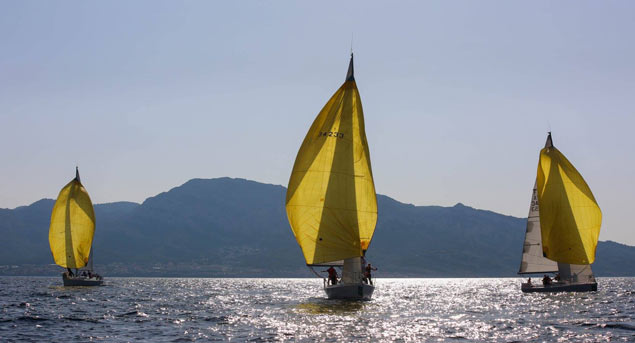 The Dublin team was disappointed that the last day of racing had to be cancelled due to lack of wind
The Dublin team was disappointed that the last day of racing had to be cancelled due to lack of wind
With a number of top three finished throughout the week, Team Ireland certainly were in contention for a podium finish, but unfortunately it was not to be.
The young team, skippered by Jack Higgins, will be setting their sights for the Irish Student Yachting Nations in April to qualify again for next year.



























